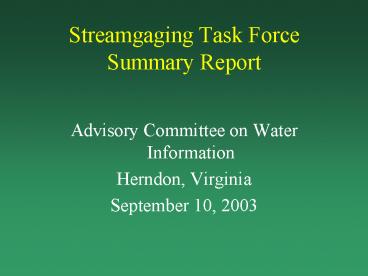Streamgaging Task Force Summary Report - PowerPoint PPT Presentation
1 / 20
Title:
Streamgaging Task Force Summary Report
Description:
League of Women Voters. Need adequate data for flood protection ... League of Women Voters, USDA, and UCOWR comments addressed by Chairs ... – PowerPoint PPT presentation
Number of Views:45
Avg rating:3.0/5.0
Title: Streamgaging Task Force Summary Report
1
Streamgaging Task ForceSummary Report
- Advisory Committee on Water Information
- Herndon, Virginia
- September 10, 2003
2
Advisory Committee on Water InformationStreamgagi
ng Task Force
- Commissioned by the ACWI in 1998.
- Charge Determine the streamflow information
needs of the Nation, identify the optimal
streamgaging network to meet the needs, and
prepare recommendations for funding
responsibilities.
3
Streamgaging Task Force Members
- Interstate Council on Water Policy
- U. S. Geological Survey
- American Association of State Geologists
- American Society of Civil Engineers
- American Water Resources Association
- Association of State Floodplain Managers
- Association of Western State Engineers
- Ground Water Protection Council
4
Streamgaging Task Force Members
- Tennessee Valley Authority
- Western States Water Council
- Bureau of Reclamation
- National Weather Service
- Natural Resources Conservation Service
- U. S. Environmental Protection Agency
- U. S. Army Corps of Engineers
5
Streamgaging Task ForceApproach
- Identified goals of a national network
- Compiled information on all available
streamgaging stations - Evaluated the achievement of National goals using
the USGS network model - Identified additional stations needed to achieve
each goal - Recommended a core streamgaging network
- Proposed funding strategies
6
Streamgaging Task ForceConcurrent Activities
- USGS developed their own plan for a National
Streamflow Information Program (NSIP). - The Interstate Council on Water Policy was
commissioned to conduct a series of four
workshops on NSIP and considerations for a
national streamgaging network.
7
Streamgaging Task ForceFinal Report
- Submitted to ACWI on April 3, 2002
- Chairman proposed a 30-day comment period
followed by a telephone conference call - Comments were received from League of Women
Voters, USDA, and Universities Council on Water
Resources - USGS provided comments in February 2003 and
suggested several changes to the recommendations
8
Streamgaging Task ForceFinal Report Comments
- League of Women Voters
- Need adequate data for flood protection
- Determine which agency Congress is most likely to
fund for the national streamgaging network - Protect critical environmental areas
- USDA-NRCS
- Real-time data delivery
9
Streamgaging Task ForceFinal Report Comments
- Universities Council on Water Resources
- Cost of gages should be compared with benefits
- TMDL goal is high priority difficult to quantify
- Real-time data delivery
10
Streamgaging Task ForceFinal Report Comments
- USGS
- All components of NSIP are equally important
- Network expenditures should not be restricted to
new stations and infrastructure costs when
existing network is not stable - Funding core network with multiple agencies is a
flawed approach
11
Streamgaging Task ForceFinal Report Follow-up
- League of Women Voters, USDA, and UCOWR comments
addressed by Chairs - USGS comments were sent to Task Force members
- Responses received from AASG, ASFPM, and ICWP
- Clarifying statements added to final report
12
Streamgaging Task ForceNetwork Recommendations
- Recommendation 1. -- USGS should adopt the
following goals for NSIP - A. Support NWS and NRCS flow forecasting
- B. Monitor streamflow of hydrologic cataloguing
units (8-digit HUCs) - C. Support Compacts, Supreme Court decrees, and
international border crossings - D. Monitor long-term trends in streamflow with an
expanded Hydrologic Benchmark Network - Larger network of HUC8 gages will support flood
protection, water quality and quantity management
and other goals.
13
Proposed NSIP Streamgaging Network
14
Streamgaging Task ForceNetwork Recommendations
- Recommendation 2. Use the COOP program and the
watershed approach for meeting other streamflow
information needs - Establish new stations in HUC 10 watersheds based
on local, state, and national needs - 25 percent coverage of each HUC 8 watershed
- Data for critical environmental areas will be
provided through the COOP program.
15
Streamgaging Task ForceNetwork Recommendations
- Recommendation 3. -- Stations providing flood
data about communities participating in the
National Flood Insurance Program should have a
high priority within the USGS COOP program. - USGS and Federal Emergency Management Agency work
with communities to establish a crest-stage gage
network
16
Streamgaging Task ForceFunding and Related
Strategies
- Recommendation 4. The USGS should implement the
network components of NSIP in five years. The
report was revised to reflect the Task Forces
support for full funding of NSIP, however, the
network should be emphasized in the initial years
of the program. - Recommendation 5. -- USGS and its cooperators
should continue to seek increases in COOP. - Restore historic 5050 funding
17
Streamgaging Task ForceFunding and Related
Strategies
- Recommendation 6. -- Network components of NSIP
should be implemented by using funding increases
to support new or reactivated stations and
infrastructure costs. Report was revised to
support the use of NSIP funds for existing
stations when cooperator funds are lost and the
stability of the network is affected.
18
Streamgaging Task ForceFunding and Related
Strategies
- Recommendation 7. -- Each USGS District, in
collaboration with its cooperators, should
develop a streamgaging strategy, including a
priority system for adding new stations. - Recommendation 8. USGS should use NSIP
infrastructure funds to verify and upgrade, if
necessary, the quality and distribution of data
from stations operated by other agencies. This
includes real-time data delivery.
19
Streamgaging Task ForceFunding and Related
Strategies
- Recommendation 9. -- USGS should continue
cooperation with other Federal agencies. This
recommendation was intended for both the USGS and
cooperating Federal agencies. USGS should fund
the NSIP network other Federal agencies should
continue to support other components of the
national streamgaging network - Recommendation 10. A similar network evaluation
should be conducted in another 10 years.
20
Streamgaging Task ForceFinal Report
- Task Force requests that the ACWI endorse the
final report and take action on the appropriate
recommendations.































